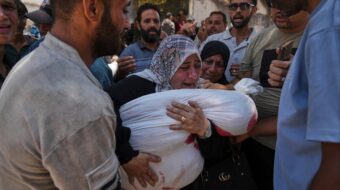Commentary
We are at a rare moment in human history. Politics has become the overriding passion of hundreds of millions and the halls of political power have been transformed into sites where vast political and social forces collide in a battle over the future. As an activist in the trade union movement said to me only a few days ago, “The world has become politicized.”
And what is so surprising is the speed with which all this has happened. It was barely a few months ago that the UN Security Council passed Resolution 1441 calling for the disarmament of the Iraqi regime.
The vote was unanimous and it seemed that everything was moving ahead seamlessly. But it was soon apparent that, despite the vote, there were tensions and differing interpretations of it.
Still, at the time, no one envisioned that these differences would grow into a vast and unbridgeable divide in the Security Council and hurl the world community into a turbulent period – which is exactly what has happened.
On the one side of this chasm are the Bush administration and its allies. And on the other side is a worldwide movement for peace and sanity, embracing hundreds of millions of people and governments of varying political complexions in every region of the world.
This truly unprecedented movement, which arguably has no equivalent in human history, depends in no small measure on a deeply embedded and spontaneously expressed sentiment for peace among the peoples of the world.
Some in the media refer to this movement as the “other superpower.” This comes as no surprise, given the movement’s diverse and global character, and that, for the last month, it has blocked the war drive of the Bush administration and the reactionary section of the ruling class that the administration represents.
But now the world is at a turning point. In a matter of days, momentous decisions will be made that will determine the fate of 25 million Iraqi people, half of whom are children, and the prospects for peace for the foreseeable future.
Obviously, the worldwide movement has to weigh in on these decisions, even more than it has done in earlier stages of this struggle. No stone should be left unturned to bring people into the streets to forestall an invasion of Iraq.
But regardless of what happens, the struggle for peace will go on. In the next few weeks, the political terrain of struggle will shift in either a favorable or unfavorable direction, but it would be overreach to say that it will set us on an inexorable path to peace or oblivion. Those are the stakes in this struggle to be sure, but many battles will be fought before one of these outcomes is reached.
While the peace movement should not underestimate its foe, it should draw confidence from the fact that in the course of the struggle to restrain the use of U.S. military force against the Iraqi regime, two diametrically different worldviews were thrown into relief for the world to see.
One view, embraced by the Bush administration, argues that we live in a new world in which “rogue” nations, “evil” dictators, and terrorist networks have rendered obsolete the old rules, concepts, laws, alliances, and global institutions that governed international relations since the close of World War II.
Moreover, policy makers in the White House go on to say that preemptive strikes, the deployment of nuclear weapons in a range of military theaters, the use of overwhelming force, a readiness to rapidly project military power all over the globe, and a go-it-alone mentality are absolutely imperative in this new era.
The other world view, which informs the outlook of the world peace movement, is fully aware of the new dangers of terrorism and the spread of weapons of mass destruction. But it sees the imminent and longer range dangers to peace, including a new round of terrorism, as organically connected to the aggression, militarism, racism, false patriotism, economic policies, and the new military doctrine of the Bush administration and U.S. imperialism.
This alternative world view calls for international treaties, reliance on world institutions, rule of law, diplomacy, the repudiation of the use of force to settle conflicts, broad scale disarmament for all countries, no use of weapons of mass destruction, sustainable economic development, and a restructuring of relations between the developed and developing countries. It rejects going “back to the future” of mutually assured destruction, jingoism, inequality, and the consequent fragile peace of that era, but instead envisions a nuclear free, economically secure and equitable world.
Which of these worldviews will win out is the overriding question facing humanity. Nothing looms larger. We all have to choose sides.
Sam Webb is the national chairman of the Communist Party USA and can be reached at swebb@cpusa.org
PDF version of ‘A turning point in human history’








